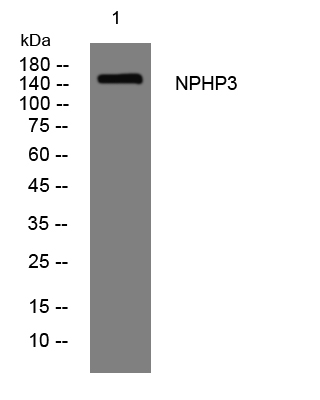- Home
- About
- Promotions
-
Products
-
Elisa Kits
- |
-
Primary antibodies
- |
-
Secondary antibodies
- |
-
Proteins
- |
-
IHC reagents
- |
-
WB reagents
- PonceauS Staining Solution
- PBST Washing Buffer, 10X
- 1.5M Tris-HCl Buffer, pH8.8
- 1M Tris-HCl Buffer, pH6.8
- 10% SDS Solution
- Prestained Protein Marker
- TBST Washing Buffer, 10X
- SDS PAGE Loading Buffer, 5X
- Stripping Buffered Solution
- Tris Buffer, pH7.4, 10X
- Total Protein Extraction Kit
- Running Buffer, 10X
- Transfer Buffer, 10X
- 30% Acr-Bis(29:1) Solution
- Tris电泳液速溶颗粒
- PBS(1X, premixed powder)
- TBS(1X, premixed powder)
- 快速封闭液
- 转膜液速溶颗粒
- Chemical reagents
- News
- Distributor
- Resources
- Contact
- Home
- >
- Info
- >
- NPHP3 rabbit pAb
- >
- Go Back
NPHP3 rabbit pAb
- Catalog No.:YT6689
- Applications:WB
- Reactivity:Human;Mouse
- Gene Name:
- NPHP3 KIAA2000
- Immunogen:
- Synthesized peptide derived from human NPHP3 AA range: 1092-1142
- Specificity:
- This antibody detects endogenous levels of NPHP3 at Human/Mouse
- Formulation:
- Liquid in PBS containing 50% glycerol, 0.5% BSA and 0.02% sodium azide.
- Source:
- Polyclonal, Rabbit,IgG
- Purification:
- The antibody was affinity-purified from rabbit antiserum by affinity-chromatography using epitope-specific immunogen.
- Storage Stability:
- -15°C to -25°C/1 year(Do not lower than -25°C)
- Molecular Weight(Da):
- 146kD
- Background:
- This gene encodes a protein containing a coiled-coil (CC) domain, a tubulin-tyrosine ligase (TTL) domain, and a tetratrico peptide repeat (TPR) domain. The encoded protein interacts with nephrocystin, it is required for normal ciliary development, and it functions in renal tubular development. Mutations in this gene are associated with nephronophthisis type 3, and also with renal-hepatic-pancreatic dysplasia, and Meckel syndrome type 7. Naturally occurring read-through transcripts exist between this gene and the downstream ACAD11 (acyl-CoA dehydrogenase family, member 11) gene. [provided by RefSeq, Feb 2011],
- Function:
- alternative products:Additional isoforms seem to exist,disease:Defects in NPHP3 are a cause of renal-hepatic-pancreatic dysplasia (RHPD) [MIM:208540]. RHPD is an autosomal recessive disorder with variable expression, and patients surviving the neonatal period progress to renal and hepatic failure which can be treated successfully with combined liver-kidney transplantation.,disease:Defects in NPHP3 are the cause of nephronophthisis type 3 (NPHP3) [MIM:604387]; also known as adolescent nephronophthisis. NPHP3 is a autosomal recessive disorder resulting in end-stage renal disease. It is characterized by polyuria, polydipsia, anemia. Onset of terminal renal failure occurr significantly later (median age, 19 years) than in juvenile nephronophthisis. Renal pathology is characterized by alterations of tubular basement membranes, tubular atrophy and dilatation, sclerosing tubulointerstitial neph
- Subcellular Location:
- Cell projection, cilium . Localization to cilium is mediated via interaction with UNC119 and UNC119B, which bind to the myristoyl moiety of the N-terminus.
- Expression:
- Widely expressed at low level. Expressed in heart, placenta, liver, skeletal muscle, kidney and pancreas. Expressed at very low level in brain and lung.

- Western blot analysis of lysates from Hela cells, primary antibody was diluted at 1:1000, 4°over night




